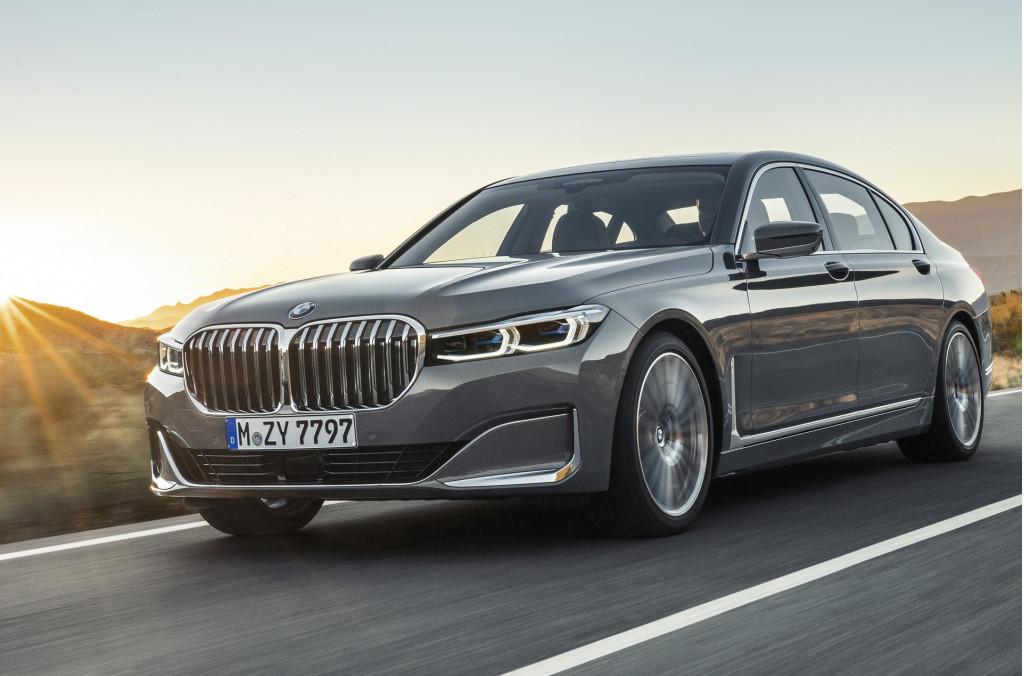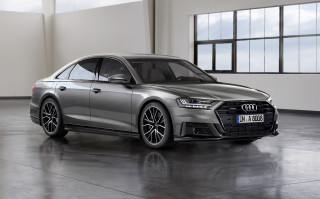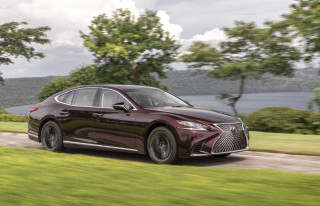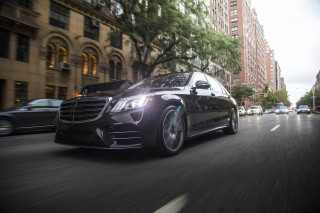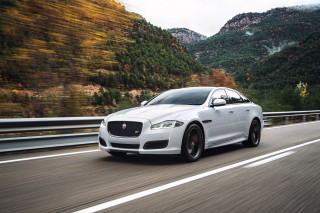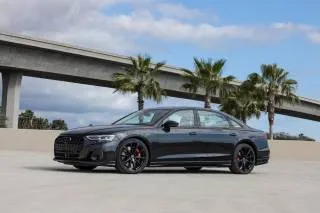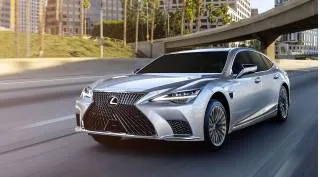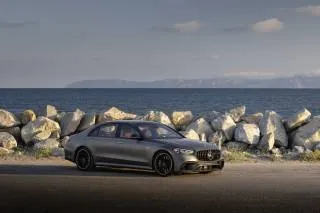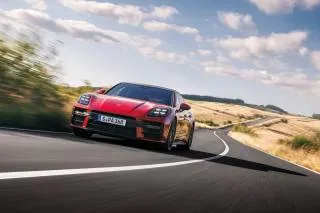Likes
- Posh interior
- Supremely comfortable ride
- Wide range of powertrains
- Impressive tech and safety features
Dislikes
- Big new grille
- Puny electric range (745e)
- Insanely pricey options
Buying tip
features & specs
The 2020 BMW 7-Series has a much bigger grille, but behind it is a posh, powerful, thirsty luxury sedan that’s loaded with tech.
The 2020 BMW 7-Series is a private jet for the road, a posh sanctuary experienced as well from the cabin as it is from the cockpit. On our scale, it earns 7.8 out of 10 overall for its commitment to comfort and quality over all else. (Read more about how we rate cars.)
For 2020, BMW has entered the 7-Series into the biggest grille competition between luxury automakers, leaving us wondering how much grille is too much grille. The rest of the exterior gets a refresh, along with improvements to materials and technology inside the car, including a new digital gauge cluster, standard active safety features, and improved connectivity.
According to BMW’s designers, the new grille is 40 percent larger than that of the 2019 model, bringing it more in line with the outlandish maw on the new X7 SUV. We’re not so sure bigger is better in this case, but the rest of the visual touches modernize the 7-Series successfully, and the interior is sublime, as always.
For such a low-selling vehicle, BMW offers one of its most diverse powertrain lineups for the 7-Series, ranging from a turbocharged inline-6 to a turbocharged V-12, with a V-8 and plug-in hybrid thrown in for good measure. Horsepower ranges from 335 to 600 horsepower, and the sprint to 60 mph can be made in as low as 3.6 seconds on the M760i, a hilarious number for such a large vehicle. The suspension is geared for comfort above all else, but make no mistake, this sedan can seriously hustle when pushed.
With prices that range from about $84,000 to nearly $200,000 fully loaded, the 2020 7-Series comes with impressive standard features like a full suite of active safety technology, premium Harman Kardon sound, supple leather, digital displays, and more. At the top of the range, buyers get a luxury rear seat package, even better audio, Merino leather, and nearly every tech feature in the book to go along with a 600-horsepower V-12.
All this luxury and weight comes at a cost though, namely fuel efficiency. Average figures range from 16 mpg combined for the thirsty V-12 to 24 mpg combined for the base inline-6. While the plug-in hybrid manages 56 MPGe with a fully-charged battery, it gets only 22 mpg combined as a conventional hybrid, so remember to charge as often as you can.
2020 BMW 7-Series Styling
A big grille and some other changes haven’t made the 2020 BMW 7-Series look much better in our eyes.
The 2020 BMW 7-Series asks "How much grille is too much grille?" Its designers may have found an answer. The ostentatious front end takes away from the handsome silhouette—but the cabin makes up ground. We give it a 7 out of 10 here.
A visual refresh for the 2020 model year brings a revised rear end and a giant front grille with slimmer headlights to make the 7-Series look more like the new X7. We’re not a fan however, as we think BMW’s wide-set twin-inlet grille looks better in smaller iterations. The new treatment makes the front end taller and blunter, sacrificing some elegance.
The controversial “hockey stick” side molding is gone too, replaced by a similar design with a squarer angle, and the rear end gets a handsome taillight treatment that is more modern looking than the 2019 version.
Inside, the only big change are new front seats from the X7. Less ostentatious than its German contemporaries, the dashboard design looks a lot like the ones in other BMWs, but material quality is top-notch and accents like metal, wood, and Alcantara turn the 7-Series cabin into a beautiful sanctuary.
2020 BMW 7-Series Performance
The 2020 BMW 7-Series charges up with a wide range of powerful engines, and soaks up miles with its cushiony air suspension.
Buckle up, because the powertrain lineup of the 2020 BMW 7-Series can occupy a whole TED Talk. Each brings with it a reason to recommend it, and all versions generate the acceleration, ride, and handling of a flagship.
We give the 2020 7-Series an 8 for performance based on its exceptional drivetrains and its plush ride and handling
The 7-Series is available with a 6-, 8-, or 12-cylinder engine, a plug-in hybrid powertrain, and rear- or all-wheel-drive. We’ll start at the bottom with the 740i, which comes with rear-wheel drive, an 8-speed automatic transmission, and a turbocharged inline-6 that makes 335 hp and 330 pound-feet of torque. All-wheel-drive is available on this model and standard with every other powertrain. BMW says it’s good for a 0-60 mph time of between 4.8 and 5.3 seconds; it’s quicker off the line with all-wheel drive.
The 750i xDrive uses a twin-turbo 4.4-liter V-8 with 523 hp and 553 lb-ft; BMW quotes a 0-60 mph time of 3.9 seconds. The M760i xDrive packs a big 6.6-liter twin-turbo V-12 with 600 hp and 627 lb-ft if you like your luxury sedans to be able to move mountains—and to rush to 60 mph in 3.6 seconds behind the unearthly whorl of a big 12-cylinder engine.
A plug-in hybrid 745e xDrive model is also available and gets a new turbocharged inline-6 to go along with its electric powertrain. The combination makes 389 hp and 442 lb-ft combined, good for a run to 60 mph in less than five seconds. Unfortunately, the electric-only range on a full charge is minimal, at 16 miles.
Adaptive air suspension comes standard, and while BMW still uses the “Ultimate Driving Machine” tagline, the 7-Series is more a boulevard cruiser than a thoroughbred athlete. Even in Sport mode, the steering of non-M-Sport models can feel vague and indirect, and though the two-plus-ton sedan will handle admirably on tight roads, this big beast is a far cry from its ancestors.
It is supremely comfortable, however, with both a Comfort and a Comfort Plus mode as well as smart sensors that scan the road ahead and prepare the suspension for large bumps to smooth out the experience. This is perhaps the only BMW where we’d happily hop in the back seat rather than the driver’s every single time.
2020 BMW 7-Series Comfort & Quality
The 2020 BMW 7-Series is very comfortable as standard, and supremely comfortable fully loaded.
Unlike Christmas dinner, the 2020 BMW 7-Series hardly has a disagreeable seat. For its plush appointments and lavish luxury options, we give it a perfect 10 here.
For 2020 BMW hasn’t messed with the interior design but has upgraded the materials and technology. Finer leather is now available, as is a 12.3-inch digital gauge cluster that’s a bit on the dark side.
The front seats are plucked from the new X7 SUV, and are supremely comfortable and adjustable, provided you spend on the right options. Leather and heat are standard in the front, while massage and cooling are both available. The rear-seat space is cavernous, and can be reupholstered with a pricey executive package that adds cooling as well as heating, massage, and power recline to its twin seats, as well as two touchscreens that can control the infotainment system and a removable tablet that acts as a remote. The new features render the 7-Series as one of the most opulent cars that doesn’t wear a Rolls-Royce or Bentley or Maybach badge.
The trunk is larger than that of both the Mercedes-Benz S-Class and Audi A8 and will swallow two large and two small suitcases, but no under-floor storage is available.
Material quality is truly top-notch, with hardly a single piece of hard plastic found anywhere in the cabin. Leather, wood, metal, Alcantara, and other soft-touch synthetics abound, and the whole interior feels buttoned-down and high-quality, even the rear vanity mirrors with their soft opening springs.
2020 BMW 7-Series Safety
The 2020 BMW 7-Series isn’t crash-test rated, but it is rife with standard and optional active safety technology.
The 2020 BMW 7-Series hasn’t been crash-tested, so we’re unable to give it a score here. Its size, build quality, and standard and active safety features suggest a supremely safe vehicle, however.
For 2020, BMW has made a full suite of active safety features standard, including automatic emergency braking, adaptive cruise control with stop-and-go, lane-departure warnings with active lane control, and rear cross-traffic alerts. An optional “Professional” driving assistance package includes a more robust traffic jam assistant system, automatic lane change assist, and more.
A head-up display, night vision, active parking assist, an interactive 3D camera system, pedestrian and animal detection, speed limit sign recognition, and even a display key that can roll the vehicle backwards or forwards out of tight parking spots are all available.
2020 BMW 7-Series Features
The 2020 BMW 7-Series’ price tag soars to six digits when it’s equipped to live its best life.
Where do we start? The 2020 BMW 7-Series is available with seemingly limitless features and options ranging from very luxurious to extremely extravagant. We give it 9 out of 10 for features, docking it a single point for value.
The base 740i comes with 18-inch wheels, a power moonroof, leather upholstery, quad-zone climate control, power-adjustable heated front seats, heated rear seats, a 12.3-inch digital gauge cluster, a 10.1-inch touchscreen infotainment system, and a full suite of active safety technology for $87,445 including destination. Adding all-wheel-drive costs $3,000 extra, but the rest of the 7-Series range gets all-wheel drive standard.
The 750i xDrive costs $103,645 and includes a 523-horsepower turbocharged V-8, and bigger wheels, while the insanely powerful turbo V-12 M760i xDrive will set you back a breathtaking $158,695 but gets 20-inch M-Sport wheels and bigger sport brakes, as well as other improvements. We’re torn between all three versions, but bet BMW buyers are most interested in the V-8 editions.
Our backup pick of the bunch would be the 745e xDrive with its plug-in hybrid powertrain for $96,545, for its luxuriant take on efficiency.
Across the lineup, options include the executive rear-seat package, premium audio from Bowers & Wilkins, a display key with remote-controlled parking, and more. Fully loaded, the 7-Series can push $200,000 easily, and you’re unlikely to find even a base model that costs less than $100,000. But then again, few vehicles can match the opulence of the 7-Series.
BMW iDrive
We’re a far cry from the very first iteration of iDrive which had a particularly rough introduction. The updated system in the 7-Series is among the best in the business, featuring both dial- and touchscreen-controlled functions that are smooth, intuitive, and clear.
With optional packages, the rear cabin features twin touchscreens on the seat backs that can play media and control nearly everything in the car, including the infotainment system up front. A removable 7.0-inch tablet is also available and can be used like a remote for nearly every feature as well.
The 7-Series also features gesture control for the center screen, but it’s finicky to use and more of a party trick than a truly useful function.
Apple CarPlay is available, and runs wirelessly.
2020 BMW 7-Series Fuel Economy
The 2020 BMW 7-Series is efficient in plug-in hybrid form, but is otherwise very thirsty.
The 2020 BMW 7-Series is as thirsty as it is opulent, but still better than many large SUVs buyers are choosing instead.
We give it 4 out of 10 here, based on its more common 6-cylinder edition. That base 740i gets 22 mpg city, 29 highway, 24 combined while all-wheel drive drops those figures slightly to 20/28/23 mpg.
The 750i xDrive performs worse at 17/25/20 mpg thanks to a much more powerful V-8 engine and standard all-wheel drive. While the M760i xDrive and its immense turbo V-12 hasn’t been rated for 2020 just yet, the 2019 model got 13/20/16 mpg, so don’t expect this year’s version to be much better.
The 745e xDrive plug-in hybrid manages a combined 56 mpg equivalent (MPGe) with a full charge, but on gasoline alone it gets only 22 mpg combined. It’s still a good pick, but a bit more electric-only range would be appreciated, as it's EPA-rated at just 16 miles of plug-in range.
